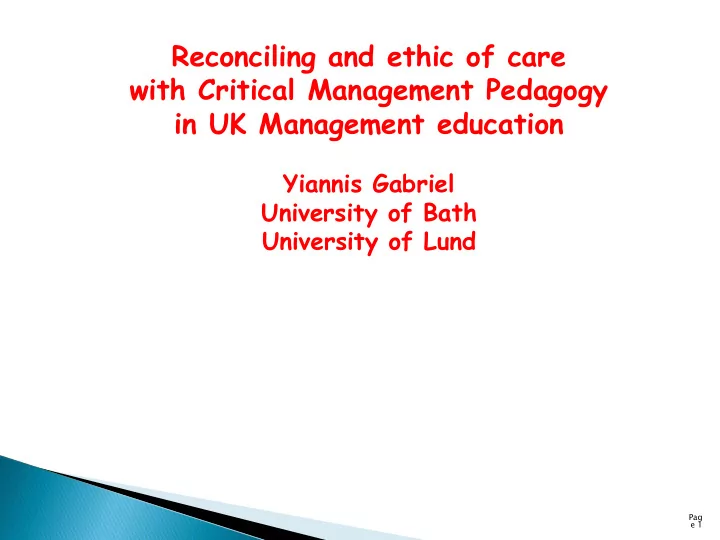

Reconciling and ethic of care with Critical Management Pedagogy in UK Management education Yiannis Gabriel University of Bath University of Lund Pag e 1
Hospitals Police Social services The BBC … Universities … and in particular Business schools
Cash cows and/or parasites Mouthpieces of neo-liberal project Irrelevant – peddlers of useless esoterica Finishing schools ◦ Pieces of paper – diplomas ◦ Interview and presentational skills ◦ Disciplinary machines Brands – competing and cannibalizing each other Machines of exploitation ◦ Of students ◦ Of their staff
Not merely more effective management … though I would not underestimate the importance of effectiveness … but also more humane, ethical and responsible management
Scientific knowledge AND practical wisdom (phronesis) Reflection AND action Ethic of criticism AND ethic of care
Criticism can be positive, negative or mixed X is not good, where X can be ◦ A theory / an idea / a concept ◦ An institution ◦ A person ◦ A process X is not good enough ◦ Imagining something better X is not what it seems
Critical of unquestioned adherence to tradition and convention Critical reflection and the reflective practitioner Critical imagination and innovation Critical of oppressive and exploitative management regimes (CMS) Critical of unquestioned subordination of knowledge to the pursuit of management efficiency
It can destroy important ideas and innovations in their early and fragile state It can destroy tested institutions without offering adequate replacements It can destroy individuals and kill learning, curiosity and innovation Consider criticism of something particularly dear to yourself (a theory, work of art, project, person) “What a distressing contrast there is between the radiant intelligence of the child and the feeble mentality of the average adult .” Freud
Those who conscientiously care for others are not seeking primarily to further their own individual interests; their interests are intertwined with the persons they care for. Neither are they acting for the sake of all others or humanity in general ; they seek instead to preserve or promote an actual human relation between themselves and particular others . (Held, 2006)
Gro rows ws out t of f a d a deep p convictio nviction n that at al all individuals ividuals ar are dependent endent on eac ach h other her fo for r their ir well ll-being being an and fl flour ourishin ishing Does es not tre reat at al all people ople as as e equa ual Goes the ‘extra mile’ or ‘beyond the call of duty’ Car arer r so sometimes metimes ac acts s as as th though ough he/she /she understan derstand d the interest erest of f the car ared ed fo for r better ter than an the e lat atter. er.
Tak akes s re responsibility ponsibility fo fot the e well ll- being ing of f other hers Not a ‘scripted’ performance Does es not fo follow llow universa iversal l prin rinciples ciples but t depend pends s on se sensitivity, sitivity, wat atchfuln chfulnes ess s an and a a par aramount amount concern ncern fo for r sustainin taining g re relations ations
An ethic of care may counterbalance the possible excess of negative criticism It may adjust criticism to the occasion, the needs of the subject and the opportunities for learning It may prompt a questioning of the ethic of consumerism and its increasing impact on education It may be used to reconfigure and re-evaluate the role of higher education teachers … and teaching as a long -standing and noble profession
Three stories
Hard work Active learning and passive learning Mistrust easy solutions
Relentless work (action) stops us from reflecting Failure to listen Information overload and the lack of meaning
Mistrust bipolarities of either/or Be mindful of forced choices
Scientific knowledge AND practical wisdom (phronesis) Reflection AND action Ethic of care AND ethic of criticism
Recommend
More recommend